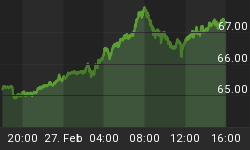Being an essay on the nature of fiat money and credit...
Okay: some items I wanted to share with you about our modern financial economy.
A few insights into how fiat money and central banking systems make the modern world go 'round. I thought this might make for good background reading on a subject that is rarely broached in mainstream media and daily public conversation.
It will also help us understand the greater forces at work in our modern, "hot money"-driven financial markets. Especially given the focus we've put on this week's events in Thailand and the emerging markets arena.
What is driving the rising tide of global liquidity that is fueling all the fast-paced investment flows and speculation? What is it about this environment that's driving deal-making and acquisitiveness to such great heights?
I spoke briefly with Dr. Marc Faber by email this week and I asked him about what had happened in the Thailand stock market.
The panic in that market (as reflected in a one day 15 percent drop in the SET index) had been set off by the announcement of capital controls on foreign share investments. Following these announcements, investment money raced for the exits as soon as the markets opened, but rebounded somewhat the next day as decisions relating to foreign share investment were quickly overturned.
I asked Dr. Faber if the credibility of the Thailand market and its policy makers had been seriously damaged by these events. Here is his response:
Sure, credibility has been shattered. But the real problem is that financial markets (excess liquidity) have outgrown the real economy and so can do things damaging to the stability of real economy. As an example: borrow yen at 1.5% and invest in Thai bills at 6%....
This is the point he made to me, and I had to stop for a minute and reflect. I was aware of the argument that he made, but I realized that this larger issue had been greatly overlooked in the coverage of this event (and other similar events).
Where was all this excess liquidity coming from? How did this flood of money and credit find its way to these varied arenas? Were market participants and outside observers missing the significance of these broader issues?
For those of us not involved in the stewardship and transfer of vast sums, we can still look to our own pockets and tabletops to see how these trends are affecting us.
Another symptom of excess liquidity or money dwarfing the real economy is that nickels and pennies can no longer be exported....
Yes, that's right! As many of you have probably heard/read, the export and melting of small change has been banned now that the value of base metals contained therein exceeds the monetary face value of the coins.
Of course, there is also the ongoing inflation that is always with us. Slowly but surely (except in times of hyperinflation when the process unfolds at a rapid pace), this phenomenon devalues the currency we hold and save. Not to mention the dislocations in economies that this process brings with it.
I asked Dr. Faber how this could continue to go on. With all we've described here, is this situation sustainable? How would it all end? His response:
Surely it will not end well in terms of social implications.
As he has mentioned before, the dislocation of the financial economy from the real economy has fostered great imbalances and a growing disparity of wealth. There are bound to be serious widespread social implications arising out of this situation.
So what can we do about all this? At the very least, we should learn and prepare for these events. It is quite possible that we are dealing with trends that will shape our world in myriad ways in the not too distant future. I don't know whether or not we can change the course that we're on, but we should certainly inform ourselves about where we stand.
With that in mind, may I suggest the following essays as a useful starting point on these issues.
Background on "hot money" flows and a discussion of Thailand's recent policy moves in, "Thailand's Rash 'Lock Up' Move", by George Friedman of Stratfor (via John Mauldin's "Outside The Box" e-letter).
A very commonsense and plain-English view of how rampant money creation affects us in our daily lives. "The Mischief of Cheap Money", by Adrian Ash.
An excellent overview on the life of Milton Friedman, with an uncompromising critique of Friedman's theories regarding issuance of money and credit. "Milton Friedman, 1912-2006", by Hans F. Sennholz.
And an interesting bit of economic history. "The Saga of John Law and Richard Cantillon", by Sean Corrigan.















